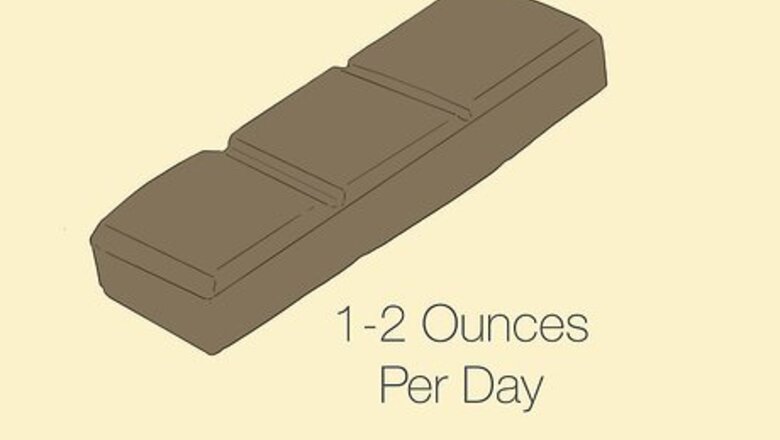
views
Eating Chocolate in Moderation
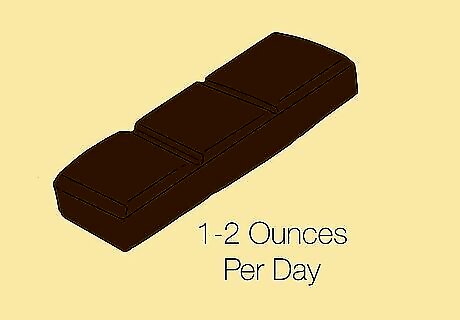
Set a goal to limit your intake of chocolate. To help you overcome your addiction and learn to eat chocolate in moderation, try setting a limit to how much chocolate you’ll eat per day or week. Once you’ve set your limit, you can then plan to only purchase that amount of chocolate so you won’t be tempted to overindulge. For example, set a goal to eat at most 2 ounces (57 g) per day.

Choose dark chocolate over white or milk chocolates. If you’re trying to manage your addiction without completely cutting chocolate out of your diet, go for dark chocolate instead of white or milk chocolate when you decide to indulge. Dark chocolate has more health benefits than white or milk chocolate, making it a healthier option. The health benefits of chocolate are derived from its cocoa content. Milk and white chocolate have less cocoa than dark chocolate because of additives like milk and sugar. Cocoa is a high in flavonoid antioxidants, which can help fight heart disease, improve vascular function, and lower blood pressure. In addition, because dark chocolate is less sweet and more rich, you’ll be less likely to overindulge.

Eat chocolate with fruit or nuts. To help you cut back on and manage your chocolate intake, choose either chocolate covered fruits or nuts, or trail-mix type snacks with a mix of all three. This will help you fill up on healthy nutrients while limiting the amount of chocolate you actually ingest.

Add more magnesium to your diet to decrease chocolate cravings. When you get a craving for chocolate, try eating other high-magnesium foods, such as nuts, seeds, whole grains, and leafy vegetables, instead. If your body is in need of magnesium, it may be contributing to your overwhelming chocolate cravings. When you swap out chocolate for other high-magnesium foods, your chocolate cravings may start to subside. Magnesium is an essential nutrient that helps your body regulate muscle and nerve function, blood sugar levels, and blood pressure. Taking magnesium can be particularly helpful in curbing chocolate cravings during your period.
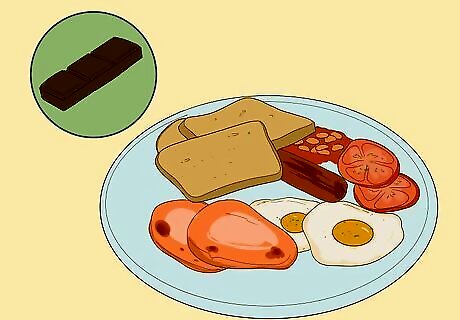
Fill up on healthier foods. If you are trying to cut back on your chocolate consumption to help overcome your addiction, try eating larger portions of healthier foods. In many cases, people with a chocolate addiction will purposefully eat less at meals to “leave room” for a chocolate indulgence later on. If you eat larger portions of healthier foods, you might find that you are too full to eat much chocolate, or that your craving has subsided for the time being.

Limit your intake on holidays and special occasions. To help you manage your chocolate addiction, avoid using holidays and special occasions as an excuse to indulge. While indulging on occasion is fine for some people, for those with an addiction, it can perpetuate your addiction, or cause your addiction to start up again. When faced with chocolate on special occasions, be mindful about your consumption and use the same approach to chocolate that you use to manage your addiction in your daily life.
Cutting Chocolate Out of Your Diet

Get rid of all the chocolate in your home and at your workplace. Throw or give away all the remaining chocolate that you have, and avoid buying it in the future. If you know that you have a chocolate addiction and need to cut chocolate out of your diet for mental or physical health reasons, one of the first steps is to remove any sources of chocolate from your life. Having easy access to your addiction will make it much harder to overcome.

Develop a mantra to remind yourself why you need to quit. When you have an addiction, it’s often easy to convince yourself that you need chocolate on a particular occasion, or that you are only going to indulge one last time. Developing a personal mantra can help you overcome these mental hurdles by reminding you why you need to overcome your addiction and that you are capable of doing it. When you have a craving or encounter a situation where chocolate is being offered, say to yourself, “I don’t need this to be happy.” It can also be helpful to have a simple mantra that you can say out loud, such as, “I don’t eat that.” That way, you are not only reminding yourself, but saying it out loud may make you feel accountable to everyone who heard you.
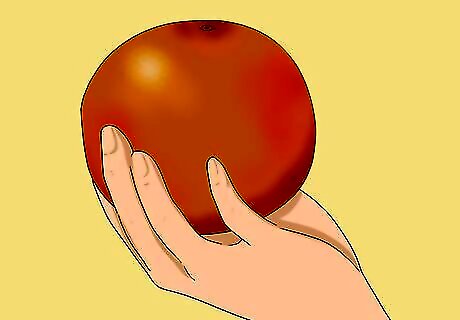
Find a new go-to sweet snack. In many cases, chocolate addictions are specific manifestations of a sugar addiction. Therefore, if you are cutting chocolate out of your diet to overcome your addiction, you may be able to replace chocolate with a naturally sweet snack to fulfil your sugar craving. Fresh fruit, for example, is a great alternative. While still high in sugar and very sweet, it is much more filling than chocolate and has more nutritional value, making it a more satisfying and healthy sweet snack.

Go for a walk when you feel a craving coming on. As you work to overcome your addiction, it can be helpful to have a go-to action that will distract you until your craving passes. A brisk 20 to 30-minute walk, for example, can both distract you from feeling like you need chocolate and give you endorphins, which may diminish your desire to indulge in your chocolate craving.

Do something that makes you happy when you’re tempted to indulge. For chocolate addicts, cravings often emerge when you’re feeling stressed, sad, or overwhelmed. Therefore, to help ward off cravings, it can be helpful to do something that makes you happy when you feel a craving coming on. You'll then be able to address the cause or trigger of your craving, which can in turn make your chocolate cravings start to subside. For example, if you’re having a bad day and feel an overwhelming urge to indulge, try calling a friend to help cheer you up instead of indulging in chocolate. After talking to a friend that makes you happy, you’ll likely feel better and have less of an urge to eat chocolate. Doing a hobby you love, such as knitting, painting, or playing the piano, can also help make you happy and keep you from indulging in chocolate.
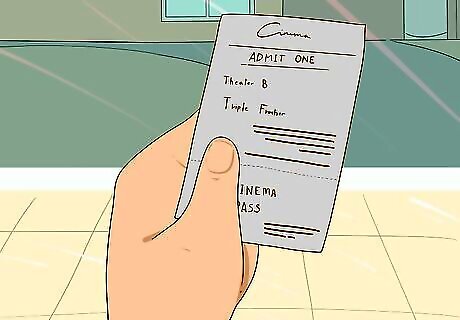
Reward yourself for avoiding chocolate. To help you stay motivated to overcome your addiction, reward yourself every so often when you’ve been able to successfully avoid eating chocolate. Even small weekly rewards can go a long way in helping you stay on track. For example, for every week that you avoid indulging in chocolate, try rewarding yourself with a spa treatment, a long bubble bath, or by going to see a movie. You’ll start to look forward to your weekly reward, which can help motivate you to keep away from chocolate.
Understanding Your Addiction

Identify when your addiction to chocolate began. To help you understand your chocolate addiction so that you can overcome it, try to first identify when you started to increase your intake and rely on chocolate. While you may have always enjoyed eating chocolate, consider what was going on in your life when you started exhibiting the signs of addiction, such as intense cravings, inability to overcome or control your cravings, and continuing to eat chocolate despite experiencing negative consequences. Addictions often emerge as a side effect or consequence of another issue. For example, you might identify that you started eating chocolate until it made you feel sick right after you lost your job. You can then begin to understand the impetus for your addiction, which is an important step in mentally overcoming your chocolate addiction.

Consider why you rely on chocolate. If you don’t eat chocolate because it makes you genuinely happy, you might be using chocolate to compensate for another feeling. There are all sorts of reasons why people crave foods, many of which are related to negative emotions. If you can identify your reasons for overindulging, you can then figure out a course of action for tackling the problem. To help you figure out why you rely on chocolate, try to pause for a few moments and pay attention to your feelings the next time you find yourself reaching for something chocolatey. Ask yourself whether you want to eat the chocolate because you simply want to briefly enjoy the taste, or whether you want the chocolate because you are sad, upset, anxious, or feeling any other emotion that is driving your desire. In other words, practice mindfulness when you eat chocolate. This will help you become more aware of your addiction, and help you identify what type of help you need to overcome your addiction.
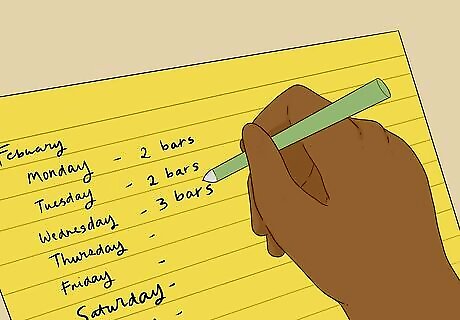
Write down when and how much chocolate you eat per day. In some cases, you may not be able to easily identify when your cravings started or why they persist. Therefore, it can be helpful to keep a daily log of when you get a craving, when you indulge, and how much chocolate you eat in each instance. This can help you not only be honest with yourself about your addiction, but also help bring to light any patterns in your cravings and chocolate consumption. For example, after keeping track for several months, you may find that you crave and indulge in chocolate much more frequently during a particular time of year. As a result, your addiction may be a side effect of seasonal depression. You may find, for example, that your chocolate addiction is worse during your period, or during times of emotional, psychological, or physical stress.

Talk to a healthcare professional to understand your addiction. Whatever the cause, having a chocolate addiction can greatly affect your physical, mental, and emotional health. As a result, it can be helpful to talk to a healthcare professional to better understand the cause of your addiction, and to create a plan for overcoming it. Mental healthcare professionals can help you better understand your addiction and deal with the underlying cause, which can in turn help you overcome your addiction. Your family physician or a nutritionist can help you understand the physical impact of your addiction on your body, and help you create a food and exercise plan that can both diminish your cravings and help reverse the negative effects on your body.



















Comments
0 comment